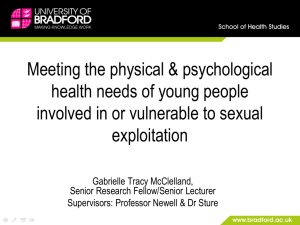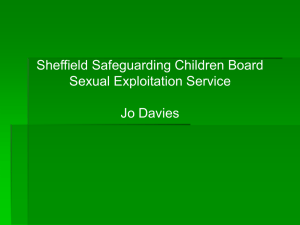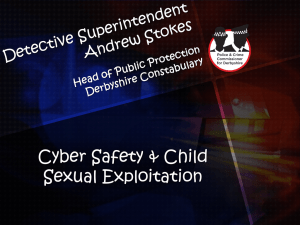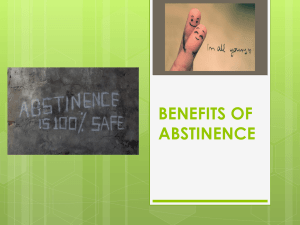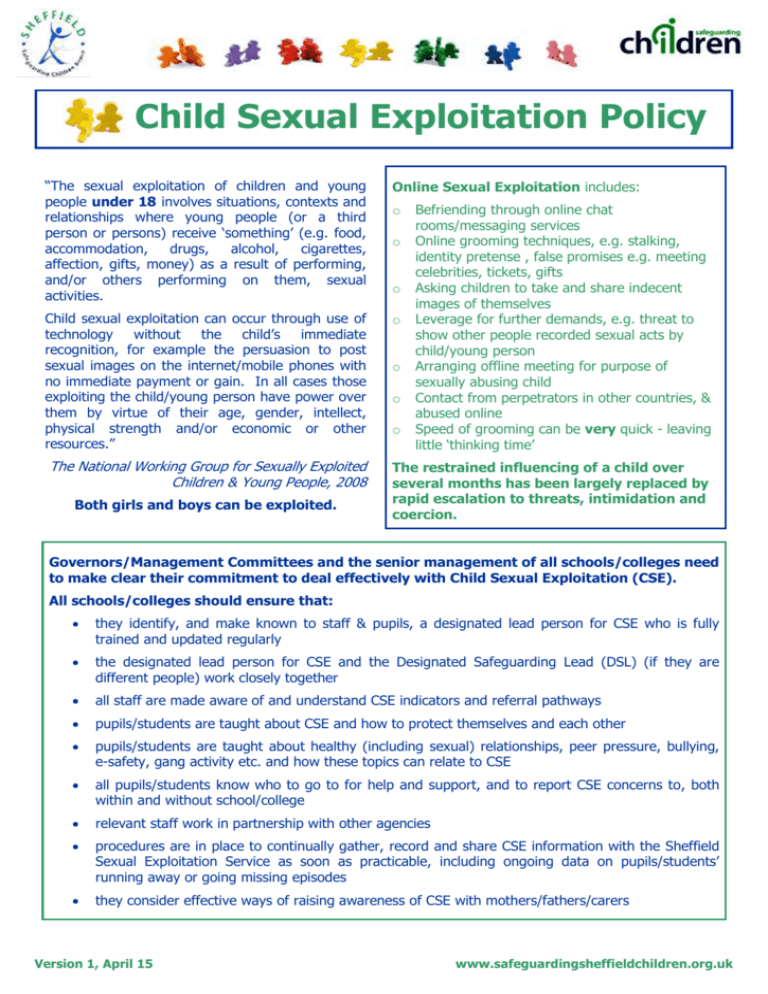
Child Sexual Exploitation Policy
“The sexual exploitation of children and young
people under 18 involves situations, contexts and
relationships where young people (or a third
person or persons) receive ‘something’ (e.g. food,
accommodation,
drugs,
alcohol,
cigarettes,
affection, gifts, money) as a result of performing,
and/or others performing on them, sexual
activities.
Online Sexual Exploitation includes:
Child sexual exploitation can occur through use of
technology without the child’s immediate
recognition, for example the persuasion to post
sexual images on the internet/mobile phones with
no immediate payment or gain. In all cases those
exploiting the child/young person have power over
them by virtue of their age, gender, intellect,
physical strength and/or economic or other
resources.”
o
The National Working Group for Sexually Exploited
Children & Young People, 2008
Both girls and boys can be exploited.
o
o
o
o
o
o
Befriending through online chat
rooms/messaging services
Online grooming techniques, e.g. stalking,
identity pretense , false promises e.g. meeting
celebrities, tickets, gifts
Asking children to take and share indecent
images of themselves
Leverage for further demands, e.g. threat to
show other people recorded sexual acts by
child/young person
Arranging offline meeting for purpose of
sexually abusing child
Contact from perpetrators in other countries, &
abused online
Speed of grooming can be very quick - leaving
little ‘thinking time’
The restrained influencing of a child over
several months has been largely replaced by
rapid escalation to threats, intimidation and
coercion.
Governors/Management Committees and the senior management of all schools/colleges need
to make clear their commitment to deal effectively with Child Sexual Exploitation (CSE).
All schools/colleges should ensure that:
they identify, and make known to staff & pupils, a designated lead person for CSE who is fully
trained and updated regularly
the designated lead person for CSE and the Designated Safeguarding Lead (DSL) (if they are
different people) work closely together
all staff are made aware of and understand CSE indicators and referral pathways
pupils/students are taught about CSE and how to protect themselves and each other
pupils/students are taught about healthy (including sexual) relationships, peer pressure, bullying,
e-safety, gang activity etc. and how these topics can relate to CSE
all pupils/students know who to go to for help and support, and to report CSE concerns to, both
within and without school/college
relevant staff work in partnership with other agencies
procedures are in place to continually gather, record and share CSE information with the Sheffield
Sexual Exploitation Service as soon as practicable, including ongoing data on pupils/students’
running away or going missing episodes
they consider effective ways of raising awareness of CSE with mothers/fathers/carers
Version 1, April 15
www.safeguardingsheffieldchildren.org.uk
What to look out for:
Warning signs:
Vulnerabilities:
ALL children and young people, including
those from supportive families can be
vulnerable to sexual exploitation. However,
some children and young people are known
to be at greater risk. For example, those that:
Children and young people who are being
sexually exploited may be:
Have a chaotic home/family life
Have a history of abuse (including familial child
sexual abuse, risk of forced marriage, risk of
‘honour’-based violence, physical and emotional
abuse and neglect)
Going missing from home or care
Absent from school
Increasing their use of social media, dating
sites, image sharing apps etc.
Involved in risky online relationships including
new contacts with people out of city
Sharing inappropriate/indecent online images
with peers, or with people only met online
Have experienced loss/bereavement
Are associated with gangs through
relatives/peers, or are living in a gang
neighbourhood
Becoming isolated/estranged from family and
friends
Meeting people befriended online
Have friendships with children/young people
who are being sexually exploited
Involved in offending behaviour
Have learning difficulties
Misusing drugs/alcohol
Live in residential care, or hostel/bed &
breakfast accommodation
Experiencing sexual cyber-bullying
Changing their physical appearance
Have low self-esteem/confidence
Are Young Carers (i.e. have caring
responsibilities for parents/family members with
mental or physical health problems, or who are
misusing substances)
Experiencing repeated sexually transmitted
infections, pregnancy and terminations
In poor mental health and/or self-harming,
having thoughts of, or attempting, suicide
Receiving money & gifts from unknown sources
Risk assessment and consent:
“In assessing whether a child or young person is a victim of sexual exploitation, or at risk of becoming a
victim, careful consideration should be given to the issue of consent. It is important to bear in mind that:
a child under the age of 13 is not legally capable of consenting to sex (it is statutory rape) or any
other type of sexual touching;
sexual activity with a child under 16 is also an offence;
it is an offence for a person to have a sexual relationship with a 16 or 17 year old if they hold a
position of trust or authority in relation to them;
where sexual activity with a 16 or 17 year old does not result in an offence being committed, it may
still result in harm, or the likelihood of harm being suffered;
non consensual sex is rape whatever the age of the victim; and
if the victim is incapacitated through drink or drugs, or the victim or his or her family has been
subject to violence or the threat of it, they cannot be considered to have given true consent and
therefore offences may have been committed.
Child sexual exploitation is therefore potentially a child protection issue for all children under
the age of 18 years and not just those in a specific age group.”
Version 1, April 15
Taken from: ‘What to do if you suspect a child is being sexually exploited’ DforE 2012
www.safeguardingsheffieldchildren.org.uk
What to do next:
Any member of staff who suspects or receives information that a child or young person may be involved in
sexual exploitation (including suspicion that they are being groomed online), should refer their concerns to
their Designated Safeguarding Lead or Deputy, who will refer the matter to Children’s Social Care.
Children’s Social Care will initiate a child protection enquiry and contact the Sheffield Sexual Exploitation
Service to consider convening a Sexual Exploitation Meeting based on the indicators of risks.
If there are concerns about the involvement of a person who:
works with children, and/or
is in a Position of Trust
…the Local Authority Designated Officer (LADO) should be informed, via the Sheffield Safeguarding
Children Advisory Service, details below.
Where appropriate, the child or young person’s wishes and feelings, as well as those of their mothers,
fathers and carers should be sought and taken into consideration when deciding how to proceed.
However, practitioners should be aware that this may not always be in the child or young person’s best
interest and may put them at further risk of harm.
Some children or young people may have been trafficked and need support to access services. Practitioners
should refer to the ‘Designated Competent Authorities’ based within the United Kingdom Human Trafficking
Centre (UKHTC) and The United Kingdom Border Agency (UKBA). Their contact details are below.
Useful Websites:
Sheffield Safeguarding and Child
Protection Procedures, including a factsheet
about Sexual Exploitation
Parents Against Child Sexual Exploitation
‘PACE’ is the leading national charity working
with mothers, fathers & carers whose children
are sexually exploited
NSPCC definitions, statistics, facts and
resources about Child Sexual Exploitation
Thinkuknow
Thinkuknow – selfies and sexting
Barnardo's spot the signs: Advice for parents,
professionals and young people on the signs of
sexual exploitation and how to keep safe
UK Border Agency (UKBA)
Advice and Support:
Sheffield Sexual Exploitation Service:
Tel. 0114 2018645
Monday-Friday, 9am-5pm
Safeguarding Children
Advisory Service:
Tel 0114 2053535
Monday–Friday, 9am-5pm
UK Human Trafficking Centre
(UKHTC):
Tel. 0844 778 2406;
Fax: 08704965534
Email: UKHTC@nca.x.gsi.gov.uk
Publications and research:
What to do if you suspect a child is being sexually exploited, DforE June 2012
Qualitative study of children, young people and 'sexting', NSPCC 2012
Version 1, April 15
www.safeguardingsheffieldchildren.org.uk

